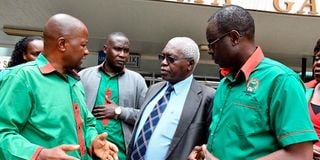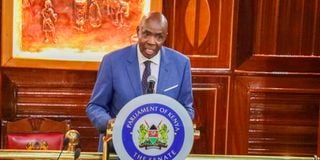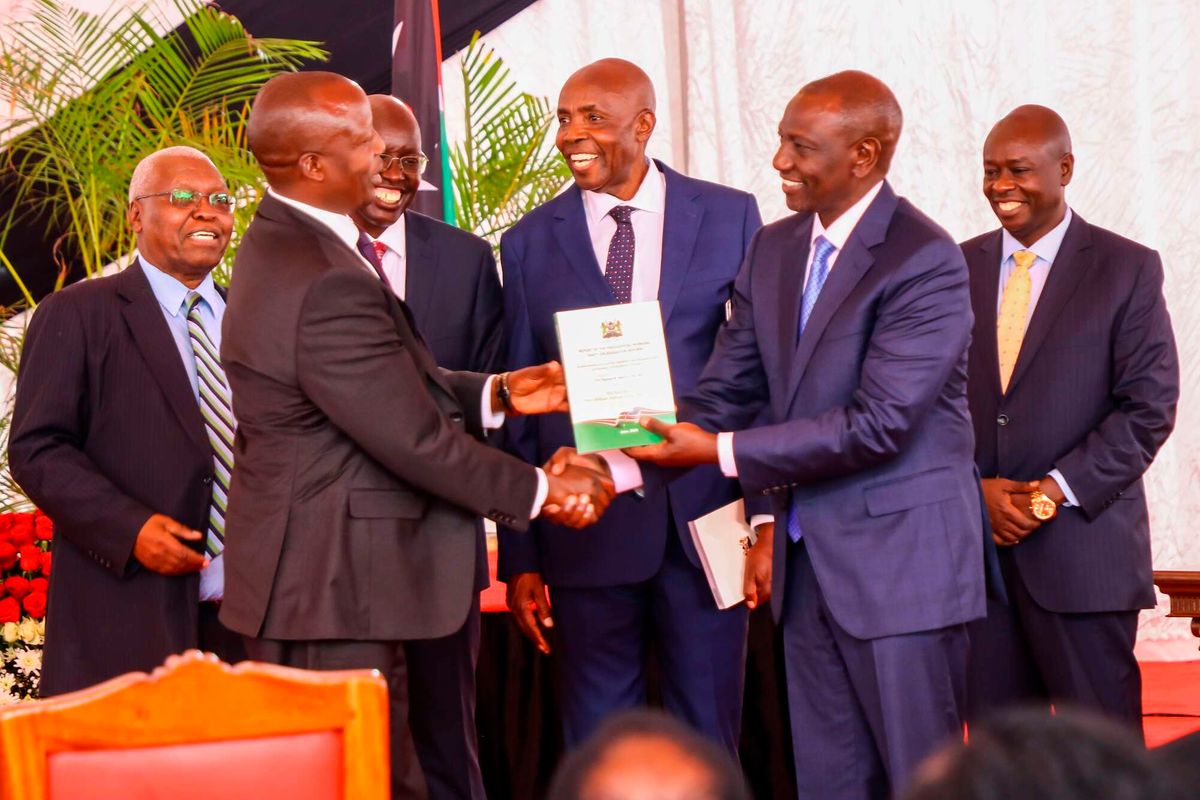[ad_1]
When he delivered his inaugural speech as President quickly after taking the oath of workplace, William Ruto made a raft of pledges on issues he wanted to perform. He listed training as one of many key precedence areas.
The President adopted up his pledge by appointing, two weeks later, the Presidential Working Celebration on Schooling Reforms to look into points in regards to the training sector from pre-school to tertiary training.
The group has since introduced its report, components of that are already beneath implementation, with various levels of success.
Nevertheless, as colleges opened for the brand new tutorial 12 months this week, heads of faculties, that are steeped in debt, have been grumbling about capitation deficits, intern lecturers deployed in junior colleges are complaining about their employment phrases, the implementation of junior college is in bother, whereas questions linger over nationwide examinations after complaints have been raised following the discharge of outcomes of the Kenya Certificates of Major Schooling (KCPE) examination in December 2023 and the Kenya Certificates of Secondary Schooling (KCSE) examination this week.
“Dedication by the federal government to the availability of high quality training is crucial. Schooling is a basic proper, a public good and inclusivity is essential, together with by way of gender. There have to be a way amongst the folks that they’re being included. This sense is so highly effective that in its absence, individuals begin questioning the kind of training their kids are receiving,” stated Joseph Wasikhongo, the nationwide coordinator of the Elimu Yetu Coalition.
Indimuli Kahi, the previous chairperson of the Kenya Secondary Faculties Heads Affiliation, instructed Saturday Nation that there are quite a few complaints by colleges in regards to the KCSE outcomes launched this week.
“There are each silent and loud complaints that some colleges don’t settle for the outcomes. There’s a problem that must be investigated. Principals change into the better goal when outcomes are unsatisfactory, however we are able to’t sweep issues beneath the carpet. The Kenya Nationwide Examinations Council (Knec) must look into the complaints,” he stated.

From left: Kenya Nationwide Union of Academics (KNUT) Nairobi Department Chairman Nyamai Kasina, KNUT Nationwide Assistant Govt Alvans Washington, Presidential Working Celebration on Schooling Reform Chairperson Prof. Raphael Munavu and KNUT Nairobi Department Secretary Macharia Mugwe consult with each other throughout public hearings on training reforms held on the College of Nairobi (UoN) Taifa Corridor on November 11, 2022.
Picture credit score: Francis Nderitu | Nation Media Group
The council has additionally been taken to account by some mother and father over the outcomes of the Kenya Major Faculty Schooling Evaluation, which was administered on the identical time with the KCPE examination in November final 12 months. That is although Knec CEO David Njeng’ere introduced on Monday that the person learner reviews and school-specific reviews are accessible on the Knec portal.
The evaluation has no bearing on development to junior college as all of the learners’ progress, however the message appears to have by no means been effectively communicated to the general public. To its credit score, the council has administered the very best variety of nationwide examinations over the past three years.
Jonathan Wesaya, the lead technical marketing consultant at Tathmini Consulting, faulted the Kenyan training system for wastage as witnessed by the variety of learners who drop out alongside the way in which. That is regardless of authorities efforts to attain a 100 per cent transition charge at varied exit factors throughout the system.
Information from the ministry exhibits that near 200,000 who transited to secondary college in 2020 didn’t sit the KCSE examination.
“The just-released examination outcomes confirmed that 54.72 per cent of the candidates scored D+ (plus) and under. Three thousand candidates failed to point out up for the examination. That’s all that was talked about and with out telling the nation who is meant to be held to account and what tracing mechanism has been put in place to make sure they aren’t misplaced within the labyrinth of points within the training sector, particularly for people who failed to sit down the exams for one motive or the opposite,” he stated.
Junior mess
The implementation of junior college is way from easy. Yesterday, Schooling Cupboard Secretary Ezekiel Machogu issued a round warning head lecturers towards alleged assortment of unlawful levies “on the pretext of increasing infrastructure to accommodate learners becoming a member of Grade 8”.
He additionally directed that these becoming a member of Grade 7 be allowed to make use of their major college uniform in junior college as mother and father make efforts to purchase new outfits.
“The federal government plans to spend Sh12.8 billion to facilitate the development of 15,015 school rooms for junior colleges over the following one 12 months,” Mr Machogu stated.

Schooling Cupboard Secretary Ezekiel Machogu fields questions from members of the Senate at Parliament Buildings in Nairobi on August 9, 2023.
Picture credit score: Dennis Onsongo | Nation Media Group
Johnson Nzioka, the chair of the Kenya Major Faculties Heads Affiliation, confirmed that the faculties have acquired the capitation for junior sections however not for major sections. He stated head lecturers must be allowed to cost mother and father to cowl for what the federal government funds couldn’t.
“Individuals wish to help a programme that they’ve had issues implementing. What’s flawed with asking for one thing little, say to make use of sufficient staff? Nevertheless, the heads ought to plan with what they’ve been given,” he stated.
He stated college heads are deploying lecturers meant for major college to show junior college if they’re certified to take action, as they await recruitment of extra lecturers. Many major colleges now have extra manpower with the absence of Commonplace 7 and eight.
Funding of training programmes stays a thorny concern. Mr Kahi stated the funding of the Free Day Secondary Schooling programme has a deficit of Sh58 billion unremitted to colleges since 2019 and, consequently, the establishments have collected large money owed. He opposed funds cuts on claims that principals misuse the cash allotted for learners.
“Do you scale back cash as a result of principals are misusing it? Cope with the responsible ones. We’ve been counting on the goodwill of suppliers and when that goodwill wanes, many faculties might be taken to court docket. Parliament needs to be compelled to acceptable funds for training,” he stated.
Heads of major colleges have additionally over time been lobbying for a rise of capitation for learners that has remained capped at Sh1,420 because the inception of the programme by the Mwai Kibaki administration in 2003.
8-4-4 learners
In the meantime, Mr Wasikhongo warned towards neglecting the remaining learners beneath the 8-4-4 system. In response to him, focus and sources are directed on the learners beneath the Competency-Primarily based Curriculum on the expense of the 4 lessons nonetheless beneath 8-4-4.
“How will we forestall the hazard of getting a ‘misplaced era’? On this, we ask the federal government to provide an assurance that this era of learners is just not uncared for and that its future is satisfactorily taken care of,” he stated.
The Kenya Kwanza administration promised to make use of 116,000 in two 12 months. During the last one 12 months, it has employed 56,000 lecturers.
Nevertheless, nearly all of them (about 46,000) have been recruited as interns and big gaps nonetheless exist.
That they had initially been employed on a one-year contract, which has been prolonged till the tip of the 12 months, with a promise of absorption into the service on everlasting and pensionable phrases.
Among the interns have protested towards the transfer and there’s a case in court docket in search of to compel the fee to make use of them.
[ad_2]


